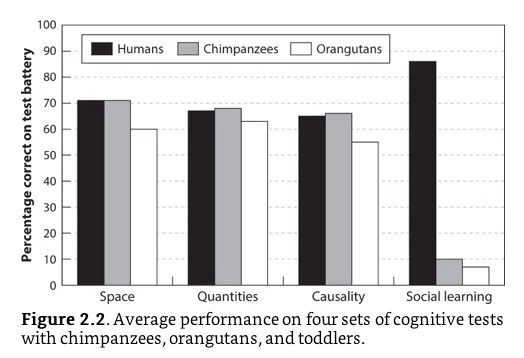Welcome to Polymathic Being, a place to explore counterintuitive insights across multiple domains. These essays take common topics and investigate them from different perspectives and disciplines to come up with unique insights and solutions.
Today's topic addresses a growing trend of labeling antisocial behavior as introversion and why that characterization misses the superpower that humans have. We’ll explore our foundation as social creatures and how introverts and extroverts aren’t at odds on this spectrum.
This is another in the series of Mixed Mental Arts. One day I’ll consolidate them but I recommend starting here for a good baseline: Embracing My White Belt
Intro
I have a dynamic personality that can often fill a room. However, people who think I’m the classic extrovert might be surprised that I can go days without leaving the house and that ‘peopling’ in large groups isn’t my thing. I’d rather have a few close friends over for a more intimate conversation than be out in a group. On the Meyers Briggs (MBTI) personality test I do code as an extrovert albeit not extreme.
I also understand that introverts have the same feelings but to a greater extent. Yet go to any sports event, concert, or church and you’ll find a healthy mix of introverts and extroverts enjoying the bonds of social engagement and energy. I share this because there seems to be a growing idea that extroverts need to be around groups of people and introverts abhore them and are only drug out through social obligation foisted on the by those needy extroverts.
I think this division is driven, in part, by a recent trend of outspoken people who claim to be introverts yet display incredibly anti-social behaviors to the point that they accuse extroverts of being vampiric.
I say ‘claim to be introverts,’ because I’m not willing to lump introverts into this shockingly, and I don’t say this lightly, pathological and ignorant group. First, it assumes that the energy that extroverts gain from social interaction comes at a loss to introverts, and second, because healthy humans are incredibly social animals.
To address the first point. Where does the energy extroverts gain from social interactions come from? Because when a group of only extroverts hangs out, they all walk away energized with no ‘juice box’ sucked dry as the Reddit post suggests. I’m energized without introverts so the energy isn’t coming from them.
This is because human interaction is greater than the sum of its parts. Everyone, even and especially extroverts, adds energy into a social situation. That energy is mixed together and built upon like putting a bunch of little matches together and creating a fire that warms everyone. I feel like the folks that express the vampire view provided their flame but then didn’t sit next to the fire.
In fact, I can say that, for me, nothing, literally nothing, is more draining than an introvert who suggests my enjoyment comes at their cost. That’s not a juice box providing energy. That’s a poison undermining our social superpower which brings us to my second and main point.
Homo Socialis
We’ve all heard ourselves referred to as Homo Sapiens. It means ‘Wise Man” and was coined by Carl Linnaeus in his 1735 work Systema Naturae. It’s predicated on the idea that our strength is in our unique, individual intelligence.
This idea certainly feeds our egos, but is it true? Over the past several decades important research has highlighted that there is a lot more to this equation than mere wisdom. Let’s start with the foundation for how we learn.
In the book The Secret to Our Success, author Joseph Henrich shows that a human toddler, a chimpanzee, and an orangutan are about the same intelligence in spatial visualization, quantities, and causality. But where humans are different is in social learning. That means building from what we see through mimicry through the intentional study of others and, even better, the intentional education of our children by others.
No other species has this superpower of social learning. It also extends beyond just learning from someone else and into the cultures and traditions surrounding us. This is because culture is the encoding of an incredible volume of social learning that we inherit. Author Donald Kingsbury captured it thusly:
“Tradition is a set of solutions for which we have forgotten the problems. Throw away the solution and you get the problem back.”
You may not like certain cultural rules or traditions but they exist for a reason and we build off them to quickly and efficiently structure and align our societies. Herbert Gintis and Dirk Helbing investigated culture as a function of evolutionary fitness in the paper Homo Socialis: An Analytical Core for Sociological Theory where they state:
“Because humans have enjoyed cumulative culture for much of their evolutionary existence, they have evolved complex social structures that serve as the background conditions for genetic evolution. It follows that individual fitness in humans depends on the structure of social life.”1
David Sloan Wilson and E.O. Wilson continue this idea and succinctly capture the concept of cultural and social success as drivers of group selection where:
“Selfish individuals outcompete altruistic individuals. Altruistic groups outcompete selfish groups.”
We aren’t Homo Sapien, we are Homo Socialis. Underlying our creativity, art, science, and technology are our interactions together and building off of each other socially which Isaac Newton described as:
“If I have seen further it is by standing on the shoulders of giants.”
One of the key driving factors separating us from the rest of the animal kingdom, and our superpower culturally and evolutionarily is our social nature. We didn’t build what we have by being wise, we built it by being social.
Social Pathology
The lone wolf is not a rugged individualist to model ourselves off of. They aren’t thriving, are typically unhealthy, and likely more dangerous because they’ve been rejected by their pack. Other wolves rightfully keep them away to protect their own packs. In humans, we have terms like sociopath, psychopath, and machiavellian, known as the Dark Triad, and then add borderline, narcissistic, antisocial, and histrionic personality disorders in the Cluster B pathologies. These are unhealthy antisocial disorders and are behind some of the greatest human sufferings from the personal level to nation-states run by tyrants.
That’s why I’ve been so confused by these self-described ‘introverts’ for years now. They seemed to emerge in force during COVID with a gleeful vengeance celebrating the lockdowns and often passionately advocating for their extensions no matter the economic, mental health, or educational consequences to the rest of the population.
I’ve struggled with their characterization of these behaviors as introversion as the actual introverts I’m friends with are not this way. For example, one of my favorite authors on Substack,
who writes , wrote the post Even Introverts Need Crowds. He nails the concept of Homo Socialis and there’s no hint of the animosity toward extroverts we are talking about.2What was fascinating is that when I restacked his post on Substack notes, one of those pathological personalities came out to, unironically, completely prove my point.
I don’t think I’m going out on a limb here to say that this isn’t a healthy person, introverted or otherwise. Here’s another person commenting on that post:
This person clearly differentiates themselves from the normal world and my main critique is that they pair introversion with neurodiversity which I just don’t think is true. In fact, I don’t think these comments reflect an introverted Homo Socialis at all. Introverts make up 50% of the population and so, are clearly part of the normative world.
The larger challenge is that the behaviors outside of the normative world include the Dark Triad and Cluster B personality disorders. Clearly, these are negative behaviors that societies have created a lot of systems to protect against.
Neurodiversity typically includes things like autism, ADHD, and OCD which are also not introversion. Lumping 50% of the human population into the neurodiverse, nonnormative world undermines the superpower that we have as Homo Socialis and excuses, or even celebrates, antisocial behavior.3 Whatever is driving that behavior is completely counter to who we are as humans and, ironically, not wise either.
Path Forward
Introverts and extroverts are both on the same spectrum of Homo Socialis. It’s part of the uniqueness, along with other personality proclivities, that creates the texture making social interactions interesting, varied, and valuable.
It’s the Homo Socialis underneath those differences that drives our creativity over AI, allows us to invent amazing things by sharing knowledge, and is the foundation of our cultures and societies that have allowed humans to build everything we see.
Don’t fall victim to the idea that these examples I’ve shared are in any way a healthy position to accept for, or about, yourself.
If you’re introverted, don’t think of yourself as a ‘juice box’ and realize that extroverts aren’t ‘vampires’ draining your energy for themselves. Remember, your extroverted friends get that energy without you, not because of you.
If you’re an extrovert, please understand some of your friends need time to recharge more than you do. Be respectful of their time and attention and appreciate their need to step away.
Let’s not accept pathological anti-social disorders as something to celebrate and categorize as neurodiverse. We need to understand how much that divides us!
Together, we can build healthy and respectful relationships that continue to leverage our superpower of social learning, creation, and empowerment.
We aren’t wise, we are social. We are Homo Socialis and that’s our superpower.
Enjoyed this post? Hit the ❤️ button above or below because it helps more people discover Substacks like this one and that’s a great thing. Also please share here or in your network to help us grow.
Polymathic Being is a reader-supported publication. To receive new posts and support my work, consider becoming a free or paid subscriber.
Check Out Refind: Brain food, delivered daily
Every day, Refind analyzes thousands of articles and sends you only the best, tailored to your interests. Loved by 503,336 curious minds. Subscribe Here
Further Reading from Authors I Appreciate
I highly recommend the following Substacks for their great content and complementary explorations of topics that Polymathic Being shares.
- All-around great daily essays
- Insightful Life Tips and Tricks
- Highly useful insights into using AI for writing
- Integrating AI into education
- Computer Science for Everyone
Even in an article challenging the economic model of this paper, the author completely agrees with the Homo Socialis underpinning
As background, Martin and I met at the Substack Office Hours shortly after we launched our Substacks. We’ve engaged back and forth for almost two years now, building on each other’s ideas and helping each other grow. A perfect example of Homo Socialis and a wonderful complement of introverted and extroverted personalities!
There’s been a push to label Cluster B and Machiavellian concepts as neurodivergent which, to be fair, are divergent from neurotypical (read healthy) people. The problem is that neurodivergent originally started to support things like Autism, ADHD, OCD, etc. which are much less antisocial than Cluster B and Machiavellian pathologies.












The following comment is from an introvert who got over 90% on the Briggs-Myers personality test twice (the accuracy of this test is a topic for another day), and I am an INTJ. I have managed many introverts in the software industry and worked with even more over the years.
I have noticed that personality is not a constant across every aspect of life (how you are at work, home, etc.). I have worked with several people I thought were extroverts, but they were introverts and used their drive time home to recover from all the extroversion they showed during their work hours or doing something alone for an hour or two at home. I have asked some of them why they behaved precisely opposite to their personality; the most common answer was that their job required it.
I love to go to the office and work there and meet with people in a small group (word small is the key) even though I am allowed to work 9 out of 10 days from home every two weeks. The time from my house to the office and back driving, which is about 1 hour and 40 minutes, becomes my “me” time where either I think about a problem or listen to a book and also my time to recover from all the energy drain that has happened during the day.
Now, I want to talk about the anti-social aspect of the article. I do not think that can be tied to one factor, either introversion or extroversion. There is always more to something than a single factor or characteristic, for example, assigning a very high IQ to success. Maybe the phrase “Correlation does not imply causation“ applies here.
I also do not believe introversion is better than extroversion or vice versa, even though some parts of society think one way or another about it. We need to focus on getting the best out of the people irrespective of their personalities on a test, but knowing their personalities helps regardless of how you see them at work.
Thus the double edged sword of science and data gathering and processing. ADHD has now been monetized and there are lots of 10 question tests that will tell you if ‘you are one’. So is there such a human that is a %100 extrovert/introvert? Shall we start identifying humans down to the Nth percentage point? Seems that the real issue is that the percentage of ‘Introverts’ is growing and the normal- i.e. extroverted, folks are the ones who will have to adapt or avoid to cope with it. In American capitalistic/competitive society we idolize extroverted behavior as being the road to public success. Even when it’s modeled by ‘Introverts’. Is it too much to ask to accept individuals as they are and celebrate the differences and not immediately correlate those as deficiencies (apologies to Rev. Jesse Jackson)? Or is this just another way to reinforce Us vs Them?